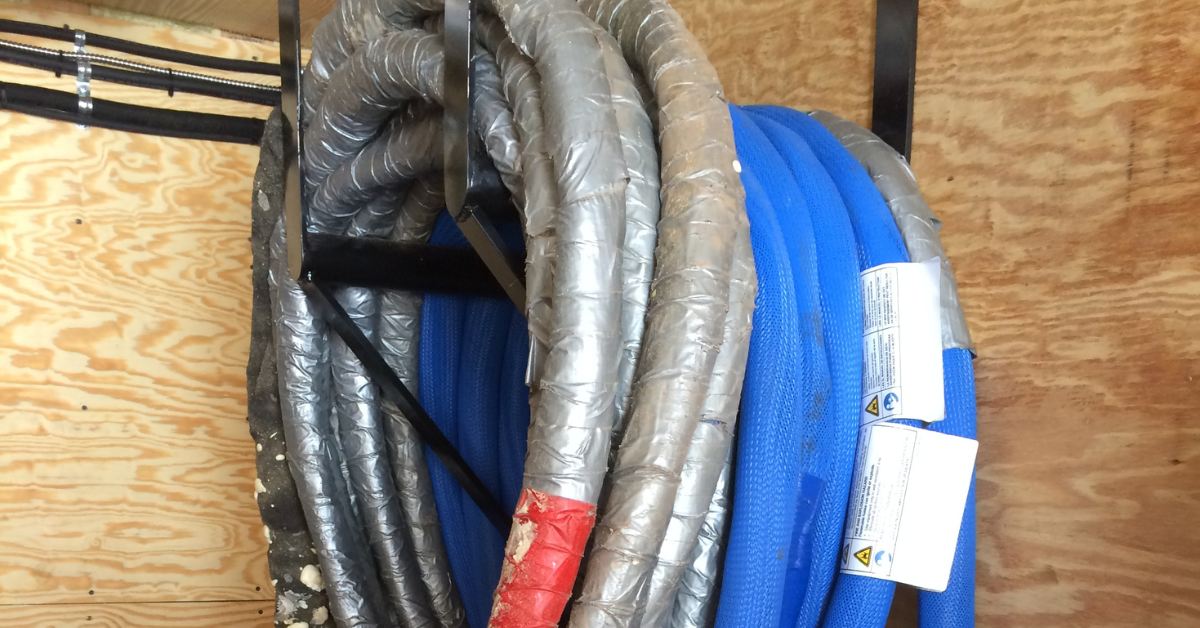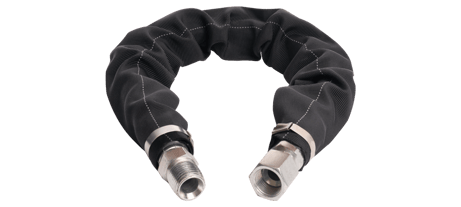
Mishandling heavy equipment can have serious, potentially disastrous consequences, especially when it comes to their hydraulics. It’s important to remember that most maintenance, even some of the most basic tasks, should be completed by an authorized dealer or hydraulics specialist.
Because of the potential hazards associated with hydraulic equipment, turning to the experts to service your equipment saves time, money, and reduces the risk of improper assemblies, unsafe patches, or catastrophic system failures.
With the goal of spreading awareness and improving hydraulic safety, we answered 14 of the highest-searched questions regarding hydraulic systems and hose maintenance:
Can I Use Duct Tape on A Hydraulic Hose? And 14 Other FAQs
Question: Can I use duct tape on a hydraulic hose?
The short answer is no.
Duct tape (or any other type of tape) will not hold up under hydraulic pressure and will cause pinhole leaks and bursts. If your hydraulic hose is leaking due to a pinhole leak, it’s important to contact your authorized hose dealer for a replacement.
Question: How to relieve pressure on hydraulic hoses
If you’re performing maintenance on your heavy equipment, relieving system pressure is an important step. It’s very important that the machine is off so the hydraulic pump is not active.
Relieving a hydraulic system's pressure can differ depending on the type of machine and the manufacturer. Contact the dealer of your machine for the proper instruction and guidance.
Question: How to clean hydraulic hoses
When cutting a hose, rubber and steel fragments, produced from the blade, settle in the hose and can compromise the entire system. Before installing a new or freshly cut hose, be sure to use a hose cleaning kit or see your authorized hose dealer for guidance.
Question: Can you patch a hydraulic hose?
The simple answer is no.
Once damage occurs, the initial integrity of the system or hose is compromised and replacement is mandatory for the safety of the machine and its operator.
Question: How Much do hydraulic hoses Cost?
The cost of a hydraulic hose can vary depending on its:
-
- pressure rating
- hose length
- fitting type
- hose material
It’s imperative that you contact an authorized dealer for guidance on which types of hoses and protective covers fit your needs.
When line-of-sight or next-level abrasion protection is required, we recommending protecting your hydraulic hose with a Diamondback sleeve, which are tested and proven to meet abrasion standards (ISO 6945 and ASTM D6770) as well as operator “line-of-sight” specifications EN02 norm 833, EN 414, ISO Reg. 3457-2003.
Question: How to crimp a hydraulic hose
Crimping hydraulic hoses should only be done by authorized dealers who have the proper tooling and training needed.
Question: How to crimp hydraulic hose Fittings at Home
Hydraulic hose fittings should never be crimped at home.
Several considerations should go into choosing new hydraulic fittings. It's important to consult with an authorized dealer to ensure the new fittings are compatible with your hose's material type and pressure rating. When it comes to installing these fittings, authorized dealers use specialized tooling to ensure they are properly and safely crimped.
Question: How to cut hydraulic hoses
While it's recommended to contact an authorized hose dealer for cutting and installing new hydraulic hoses, if you choose to tackle it yourself, it's important you have the right cutting gear.
To prevent debris from contaminating your hose, ensure you're using a chop saw and cut-off saw blade rated for hose cutting. Contact an authorized dealer equipped with specialized saws and tools designed to ensure hose integrity and cleanliness.
Question: How to fix a hydraulic hose
Hydraulic hoses cannot be fixed if damage has occurred. Trying to mend, patch, or otherwise fix a damaged hose will result in excessive machine damage and operator injury.
If damage has occurred to one of your hydraulic hoses, its integrity has been compromised and is no longer safe to use. For the safety of your staff and equipment, it’s imperative that you contact your dealer for a suitable replacement and installation.
Question: How to Measure hydraulic hose Length
When you need new or replacement hoses for your hydraulic system, measuring them can be challenging. For existing hoses, straighten the hose and measure from one end to the other. Don't forget to include the fitting lengths to ensure you're calculate the correct hose length.
When routing new hoses, determine the connection points the hose will travel to and and from, and measure the distance between these points. Be sure to consider the machine's other components, ambient conditions, framing, and any potential pinch points that may occur during operation.
Question: How to Protect hydraulic hoses
Adequately protecting your hydraulic hose involves considering ambient conditions like abrasion, heat, and chemical exposure. To ensure maximum protection, use a protective wrap or sleeve, such as Python's 5601 Sidewinder or Diamondback Pro Sleeves.
Question: How to splice hydraulic hoses
Splicing hydraulic hoses is not recommended and should never be attempted at home. Contact your authorized hose dealer about alternative solutions.
Question: How to repair a leaking hydraulic hose
Leaking hydraulic hoses present a real danger to the safety of the machine and its operator. Attempting to repair a leaking hydraulic hose at home is never recommended and will not adequately protect your equipment or operator. To avoid costly downtime and reduce the risk of operator injury it’s important to contact your dealer for a replacement hose.
Question: Can hydraulic hoses be used for propane or gasoline?
Hydraulic hoses are designed exclusively to operate with hydraulic fluid and should only be used for hydraulic applications.
Hoses must be rated for the fluid/gas they are transporting. Gasoline requires specific, anti-static rubber lining on the inside of a hose to properly protect the hose. Propane also requires a specialized liner to transfer the propane in its various states of matter.
Hydraulic lines are meant for hydraulic fluid, keep the other gasses and liquids away and contact your authorized dealer for guidance on hose application.
Question: How to bleed hydraulic lines
Bleeding your hydraulic lines is an important step of the installation process and should be handled by the professionals. Since this process can differ depending on the type of machine, contact your dealer for the proper instruction and step-by-step guidance.
Hydraulic Hose Systems | Trust the Experts
To maximize the efficiency, safety, and lifespan of your hydraulic system, it’s important to have authorized professionals perform regularly scheduled maintenance and upgrades to your equipment.
When completing routine maintenance at home, it’s also imperative to have an open line of communication with your dealer and ensure you follow their step-by-step guidance closely. Remember, replacing a hydraulic hose or adding a protective cover to existing lines is a lot less expensive than having to buy a new machine or pay for costly medical bills.
For more information on protective solutions for hydraulic hoses, contact us today or check out the following blogs & video resources:
Blogs
- How (and Why) to Protect Hydraulic Hoses
- Hydraulic Hose Protection for OEMs: A Good, Better, Best Discussion
- Tubular Hydraulic Hose Sleeves | Buyers Guide
- Comparing Spiral Wrap vs Hydraulic Hose Wrap
- Heavy Abrasion Protection Sleeve – For Hydraulic Applications and More
- Line of Sight Testing of Hydraulic Hoses with Pinhole Failures | Diamondback Sleeve
Videos

